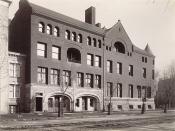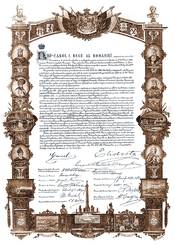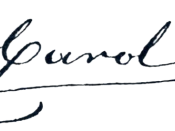Oleanna has been much publicized as a play about political correctness, about sexual harassment, about the relations between professors and students, men and women. On one level, you could make an argument for these claims. Yet Oleanna defines itself as a play about individual responsibility. As Carol, one of the characters, says, "What has led you to this place? Not your sex. Not your race. Not your class. YOUR OWN ACTIONS" (39). This is a play where the characters claim a doctrine of self-evaluation according to basic actions. The contradiction lies in their mutual failure to behave with respect towards each other, and Oleanna becomes more of a play on dysfunctional individuals, rather than on sexual politics.
Oleanna is a brief exchange between two people. The whole play spans only a few days; each transaction, each Act, takes about half an hour. What can happen between two apparently harmless people, in such a short time, that by the end of the play one person has been attacked, and the other person's career and family is torn apart? Who are these people? John is a forty-something university professor. On the surface, he appears fairly innocuous, a typical professor. Certainly, he is arrogant and controlling. Whether conscious of it or not, he feels himself superior to the student. However, John feels threatened. He has a lot to lose: his tenure, his position, his wife and son, his home.
Carol is a twenty-year-old student, insecure and worried about her grade. She feels inadequate because she doesn't understand the professor, his book, or his course. Carol also feels threatened. She too has a lot to lose. She states clearly that she can't afford to fail this course. Presumably a failure will multiply into several losses: possibly expulsion from a particular program, or the refusal of a student loan, maybe the end of her chance at university.
Certainly, Oleanna is about power. Who holds it, who can take it. And Oleanna appears to be about the timely and sensitive subject of sexual harassmentÃÂpolitical correctness, in all its importance and pettiness.
Ironically, Oleanna is all about words. That is all we have in this play. John speaks; John answers disruptive and distressing phone calls; Carol tries to speak; John interrupts; Carol reclaims her right to speak. Almost nothing ever happens.Yet both characters agree that actions are the most important test of humanity. In Act One, John says, "You have to look at what you are, and what you feel, and how you act. And, finally, you have to look at how you act. And say: If that's what I did, that must be how I think of myself" (18).
At the end of the play, Carol throws John's idea back at him: "You have an agenda, we have an agenda. I am not interested in your feelings or your motivation, but your actions" (44).
It is interesting to measure John and Carol individually, against their own standards. Despite the lack of action in the play, we can still describe what we know of each character's behaviour. Sadly, they both fail their own test of humanity.
In Act One, John continually interrupts Carol, rarely letting her finish a thought, or even get more than one word out. He even cuts off her attempts to voice herself. Carol repeatedly begins, "IÃÂIÃÂ" only to be interrupted again. John obviously considers his own theories, his own problems, his own ramblings of more importance even than Carol's "I". By the end of Act One, Carol is about to reveal an important personal secret. John interrupts, to rush off to his "surprise" tenure-announcement party.
John's attitude of superiority is even more arrogant. He considers himself in a position to approve or disapprove of Carol's attempts to understand him. He interrupts her attempts to speak with unnecessary and irrelevant praise, inevitably cutting off her speech and rerouting the conversation back to his own interests: Arrogance carries John through the second act as well, failing him only in Act Three when he (almost) surrenders to Carol's demands. In Act Two John feels certain that he is still in control, repeatedly trivializing her complaint: "They will dismiss your complaint" (29) and "It's ludicrous. Don't you know that? It's not necessary. It's going to humiliate you, and it's going to cost me my house, and ..." (31).
Eventually, John offers to reinvent the course for Carol. On the surface, he states simply that they will throw out her marks so far. He will guarantee her an "A" if she continues to meet with him in his office. This appears to stem from John's unconventional attitude toward the education system (after all, he considers a university education no more meaningful than hazing). From John's perspective, this is likely an innocent and generous offer: Your grade for the whole term is an 'A.' If you will come back and meet with me. A few more times. Your grade's an 'A.' Forget about the paper. You didn't like it, you didn't like writing it. It's not important. What's important is that I awake your interest, if I can, and that I answer your questions. Let's start over. (19) The verbal exchange only becomes physical at the end of each act. At the end of Act One, John puts his arm around Carol's shoulder, supposedly to comfort her. She walks away. At the end of Act Two, John is moved by fear and desperation to try to restrain Carol, and stop her from leaving his office. By the end of Act Three, he loses control and becomes violent, knocking Carol to the floor and threatening to hit her with a chair.
So John's actions, throughout the play, condemn him according to his own precept. His actions, including the words he chooses to voice, show him to be arrogant, inconsiderate, and self-centred. His few physical acts show him to behave inappropriately and with poor judgement (at best), and violently (at worst). John is not a gentleman scholar.
In the first act, Carol's behaviour is unsure and emotional. She tries repeatedly to speak, only to be cut off by John. She says she's confused and frustrated by her inability to understand her professor. She admits to feeling inadequate: "... and I walk around. From morning 'til night: with this one thought in my head. I'm stupid" (12). Carol is insecure, and her professor's intellectual aggression hurts her: It becomes evident that Carol is panicking about the course, her grade, and her failure to understand. Her panic spills into full view in one of Carol's longest uninterrupted speeches of Act One: Nobody tells me anything. And I sit there ... in the corner. In the back. And everybody's talking about "this" all the time. And "concepts," and "precepts" and, and, and, and, and, WHAT IN THE WORLD ARE YOU TALKING ABOUT? And I read your book. And they said, "Fine, go in that class." Because you talked about responsibility to the young. I DON'T KNOW WHAT IT MEANS AND I'M FAILING ... (13) This emotional exposure is not the only one Carol is willing to make. Later in the conversation she appears to lose control, and possibly cry (depending on how it is acted). This is when John first approaches her physically. She responds firmly to this approach: "NO! (She walks away from him.)" (25). Yet John persists, approaching her, comforting her, soothing her, and inviting her to disclose her feelings. Carol appears to succumb to this approach. She is about to reveal a personal secretÃÂbut is stopped by yet another phone call.
While such emotional outbursts are inappropriate in a professional setting, they will probably always occur in moments of extreme anxiety. John crosses the line of professionalism when he encourages personal disclosures and physically approaches Carol. Yet Carol also crosses this line, prying into John's personal life: Later, Carol uses this conversation against John, apparently forgetting that she initiated it: "He told me he had problems with his wife; and that he wanted to take off the artificial stricture of Teacher and Student. He put his arm around me ..." (31). If the first crossing of professional boundaries was inappropriate, then surely using the ensuing confidences is even more inappropriate.
In the second act, Carol has already made a formal complaint against John's behaviour. She is considerably more assertive, perhaps because she can refer to her report. She is even able to question and contradict John: Nonetheless, Carol still feels insecure. She blames it on John instead of on herself this time: ". . . ÃÂyou mock us. You call education "hazing," and from your so-protected, so-elitist seat you hold our confusion as a joke, and our hopes and efforts with it" (33).
Perhaps Carol's insecurity is the reason for her continued visits to John's office. If her complaint against John's behaviour were being handled professionally, she would simply submit the report and allow the problem to be handled through the Tenure Committee. Instead, she returns to John's office twice, at John's request. These visits give Carol a chance to enjoy her new power over her old superior. She repeatedly threatens to leave, so that John must entreat her to stay: By Act Three, Carol appears to be in full control of the action. She can control John's conversation by threatening to leave. She can control his professional life by pursuing or dropping her complaint. She may even be able to control his work by forcing him to withdraw a list of books from his class curriculum (including his own book). She goes so far as to try to control his personal life: This is the final insult for John, and he loses his temper, attacking Carol violently.
Onstage, Carol's actions portray an insecure, sometimes angry young woman, whose behaviour shifts from submissive to controlling as the play progresses. In the first act, she attempts to regain some personal power by asserting herself and gaining personal information about her professor. By the second act, she has successfully regained her personal power, through writing her report against John offstage. By the third act, she has gained enough power to try to dictate terms to John. Whether she is viewed as a manipulative young woman, deliberately provoking John to violence, or as an evolving person, growing into her own strength, Carol's behavior is definitely questionable. Like her professor, she transgresses the limits of civil behaviour. By Act Three, she acts as arrogant and powerful as John does in Act One.
If, as both John and Carol maintain, action is more important than feelings or motivation, then both John and Carol's actions are poor examples of a professor and student. Neither one is able to see beyond the limits of their own self-interests





